Nepalese women in general who dream of managing their own businesses face many challenges. A disabled young girl born into a family that has been in bonded labor for generations and shares the same ambition, faces even larger challenges. This is because any person living with any disability is less likely to participate actively in making decisions that concern him or her and is less likely to have his or her protection needs met. Asha Kumal, 18, was born deaf and dumb. She has been dependent on her family and friends to communicate with the rest of the people. She started life at a disadvantage, having to always do something extra just to be on the same level.
From a young age, Asha viewed going to school as a huge privilege and she was always very eager to learn, her father, Bhagu Bahadur Kumal, explains. While in school, Asha experienced learning difficulties as much as she looked ‘normal’. She became disenfranchised because her educational needs were not being met. She developed low self-esteem and eventually dropped out of school at class 3. Her father informs us that there is an inadequate number of special need schools in Nepal. The few that are available are widely scarce and are only found in major towns. He also says that the number of teachers trained to teach special needs students is low despite the large number of children living with disabilities. Many of these children are deprived of access to basic literacy and numerical skills, he says. But he is very proud that Asha can at least read and write.
Globally, disabled people are faced with discrimination and barriers to full participation in employment programs and skills training. Because of ignorance and discrimination, disabled people are often debarred in work. Society’s argument is centered on their inability to compete on the basis of relevant skills or qualifications. Many communities, mostly in developing countries, still associate disability with curses and bad omens. This is the case in Nepal too. Unfortunately, this has impeded the country’s development of services for children with disabilities, prevented parents from accepting their children’s disabilities, and makes social inclusion for these children almost impossible. BASE, however, provided a 3-month specialized training course at a nearby community training center as a way to empower young women who had been freed for the Kamaiya system and to also shift the mentality surrounding disabilities to bring part of the population out of the shadows. Asha attended this training in 2015 and learnt how to sew pieces of clothing.
Shanta asks Asha what she thought of the vocational training program and whether she would like to enroll in another one (in Nepali):
She responds through sign language:
“I liked training and it was good for me. I need more training on the latest fashion trends. Right now, I can only make a petticoat which I sell for 100 Nepali Rupees and a kurta (a local Nepali clothing) which I sell for 250 Nepali Rupees.”
The word ‘opportunity’ means a set of circumstances in which a course of successful action is possible. Opportunity is scarce for disabled people. But what is even more rare is the willingness to take advantage of an opportunity that may present itself. A person with no money, no education, no connections can rise as far as his or her ability and ambition will take him or her. The importance of these vocational training programs cannot be over emphasized. By equipping former Kamlaris and / or their children with basic skills in technical fields will enable them to pursue employment opportunities which will ultimately contribute towards their socio-economic inclusion.
In Andrew Carnegie’s words, a “man may be born in poverty, but he does not have to go through life in poverty. He may be illiterate but he does not have to remain so. But . . . no amount of opportunity will benefit the man who neglects or refuses to take possession of his own mind power and use it for his own personal advancement.”
Posted By Michelle Nyaga
Posted Jul 24th, 2018


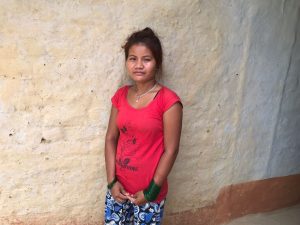
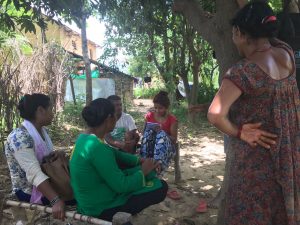
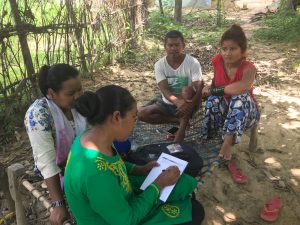
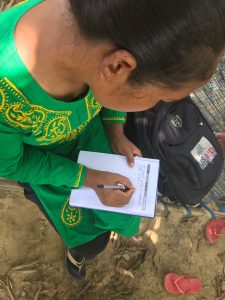
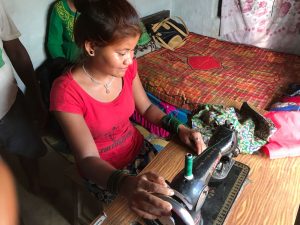
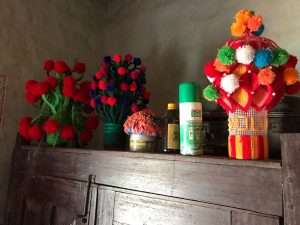
3 Comments
Corinne Cummings
July 24, 2018
Hi Michelle, it was a pleasure to read Asha Kumal’s story — she sounds like a lovely human being. Her tenacity is impressive towards sewing; it’s great that she wants to learn how to sew the latest trends. Living with a disability is very challenging, the fact that she is overcoming these obstacles says a lot about her character. She’s a strong young lady! Thank you for sharing her aspiring story. I hope she’s able to gain the skills that she’s striving to achieve with sewing so that she’s able to make more types of clothing. I am looking forward to reading your next blog. Best, Corinne
Princia Vas
July 30, 2018
What a wonderful blog, Michelle. And I liked that you shared the difficulties faced by disabled people through the story of Asha Kumal. The title of your post in particular was very captivating!
iain
August 5, 2018
I love the way you’re building up an argument for vocational training. I predict that you’ll face two challenges: first, ensure that the freed kamlaris get professional training that will enable them to really compete for jobs; and second, help them secure a job or make a living some other way. BASE is not in the business of job creation! How do you and your hosts – BASE and the FKDF – play to get around this?